
Fine Classical, Instrumental, and Specialty Recordings
Label: Soundset Recordings Item Number: SR1071 Format: CD Year Recorded: 2015 Four American Stories Baylor Brass Wiff Rudd - Trumpet Mark Schubert - Trumpet Jeffrey Powers - Horn Brent Phillips - Trombone Kent Eshelman - Euphonium
Baylor Brass  Baylor Brass brings a wealth of experience to its performances and educational clinics. Comprised of the Baylor University brass faculty, the group concertizes regularly on the Baylor campus, in the public schools throughout Texas, and on tours of the major music schools outside Texas and to foreign countries. Baylor Brass members have impressive credentials as chamber music performers, clinicians, and instrumental coaches. This directly benefits the students at Baylor through chamber music classes and activities of the individual brass studios that are overseen and coached personally by members of Baylor Brass. They believe that the playing abilities, collaborative skills, and musical awareness developed in rehearsing and performing chamber music equips Baylor’s students to be more effective in large ensembles and as professional performers or educators. Wiff Rudd - Trumpet 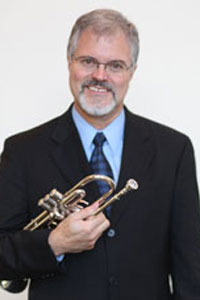 Wiff Rudd joined the faculty of Baylor University’s School of Music in 2002, having previously taught at the University of Arkansas (1998-2002) and Oklahoma Baptist University (1978-1985). He received music degrees from Baylor University (BME) and the University of Northern Colorado (MM). His primary mentors include Ron Fox, William Pfund, Michael Ewald and Larry Skinner. In 2010 Wiff received Baylor’s Outstanding Faculty Award in Teaching and was named the Centennial Professor. The latter provided a grant for Collaborative Practice Concepts for Trumpet, self-published by WR Enterprises in 2013. Other publications include Aaron Witek’s book, Gordon Mathie: The Treasured Legacy of a Master Teacher and Performer (2014) and Jordon Tucker’s Sonata for Trumpet and Piano (2015). The Baylor Trumpet Studio has been enthusiastically involved with the National Trumpet Competition since 2008 where the trumpet ensembles have won six prizes: 1st (2015, 2013, 2011), 3rd (2014, 2012), and 4th (2009). Wiff began serving on the NTC Executive Board in 2014. He is also affiliated with the International Trumpet Guild, the Texas Music Educators Association, and has been a Yamaha Performing Artist since 1988. Wiff plays with Baylor Brass, is principal trumpet of the Waco Symphony and performs often with the symphonies of Dallas, Houston, Harrisburg and Fort Worth. He has performed and presented master classes at more than 300 universities and conservatories on five continents and as a featured artist in several Carnegie Hall concerts, the Midwest International Band and Orchestra Clinic, the Texas Music Educators Association Conference, the National Trumpet Competition and International Trumpet Guild Conferences. Mark Schubert - Trumpet 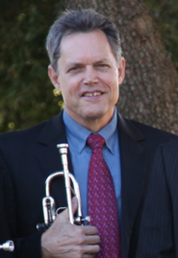 Prior to joining the Baylor University faculty in 2011, Mark Schubert was a member of the Honolulu Symphony for thirty-three years and a founding member of the Honolulu Brass, a resident ensemble of Chamber Music Hawaii. Mark also taught applied trumpet for eighteen years at the University of Hawaii and has been serving on the faculty of the Brevard Music Festival and Institute in North Carolina since 1994. At Baylor, besides his work in the brass area and with the Baylor faculty brass quintet, he serves as Coordinator of Chamber Music Studies for the brass, woodwinds and percussion. Mark has performed with many orchestras including the Boston Symphony Orchestra, the Filarmonica de las Americas (Mexico City), the Opera Company of Boston, the Houston Symphony and Houston Grand Opera. As a soloist and clinician he has worked in Japan, Mexico, across the South Pacific, Argentina and throughout the United States. Mark graduated with honors from the New England Conservatory of Music (BM) and Baylor University (MM). He was a Tanglewood fellow and is an alumnus of the Brevard Music Festival. His primary trumpet teachers and influences include Armando Ghitalla, Wiff Rudd, Arnold Jacobs and Roger Voisin. Mark is a Yamaha Artist/Clinician. Jeffrey Powers - Horn 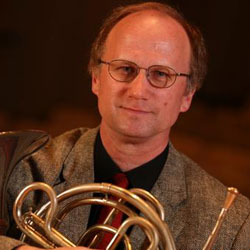 Jeffrey Powers, Professor of Horn, Baylor University School of Music, holds a Bachelor of Arts degree with “Honors in Music” from Austin College in Sherman, Texas and a Master of Music in Horn from The Cleveland Institute of Music. His major instructors were James London of the Dallas Symphony Orchestra, Albert Schmitter and Myron Bloom of The Cleveland Orchestra, and Roy Waas of the Buffalo Philharmonic. Having begun his career as second horn in The Hong Kong Philharmonic, Mr. Powers then served as second horn in the New Jersey Symphony, fourth horn in the Philharmonic of Caracas, Venezuela, and fourth horn and Wagner tuba in The Cleveland Orchestra. He then played Principal horn for sixteen years with the Royal Philharmonic of Flanders, Antwerp, Belgium and taught horn, chamber music, and transposition at the Lemmens Institute in Leuven, Belgium. Presently Mr. Powers is Principal Horn with the Waco Symphony Orchestra and the Abilene Philharmonic, and is a member of the Baylor Brass Quintet and the Baylor Woodwind Quintet. Mr. Powers is known for his clinics and master classes. He has five solo CDs released to date: Let All That Hath Breath Praise the Lord – Music of Praise for Horn; Into the 21st Century – Music for horn and piano by Baldwin, Bentzon, Pilss and Vignery; In a Lyrical way – Music for Horn and Piano by Flemish Masters; and Steppingstones for Horn, Volume I and Volume II. Brent Phillips - Trombone 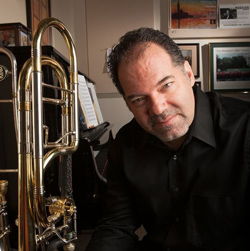 Brent Phillips began his professional musical career with the prestigious “President’s Own” United States Marine Band. While a Marine, he served as assistant principal trombone, was a frequent soloist with the band and the Marine Band Chamber Orchestra and was the featured soloist on the band’s fifty-two-day national tour in 2000. He was principal trombone of the Harrisburg Symphony Orchestra for fifteen seasons and currently plays principal trombone with the Waco Symphony and the Abilene Philharmonic. Mr. Phillips was a founding member of the touring trombone quartet Stentorian Consort and has released two CD’s on Albany Records. He has appeared regularly with the orchestras of Dallas, San Antonio, and his hometown, Houston. As a soloist, he has performed with the Harrisburg Symphony and at distinguished venues such as the Great American Brass Band Festival, the Eastern Trombone Workshop, Trombonanza Music Festival in Argentina, International Trombone Festival and the Texas Music Educators Association Convention. His recording credits include the Marine Band, Discovery Channel, Animal Planet, “Performance Today” on National Public Radio, the Stentorian Consort, and two solo CDs. During the summer, Mr. Phillips is on the faculty of the Round Top Festival Institute. Kent Eshelman - Euphonium  Kent Eshelman is Associate Professor of tuba and euphonium at Baylor University, having joined the faculty in 2009. He holds a doctorate in tuba performance from Michigan State University, a master's in tuba performance from the University of Wisconsin-Madison, and bachelor's degrees in tuba performance and jazz piano from the University of Michigan. He has taught at Northern Arizona University, Western Kentucky University, Grand Valley State University, and the Interlochen Arts Camp. As a soloist, he has won first place in numerous national and international competitions, including the Leonard Falcone (USA) and Jeju (Korea) competitions, and has premiered works by Bruce Broughton, Frank Lynn Payne, and Anthony Plog. As a jazz artist, he has won the Rich Matteson International Competition, performed as soloist with the U.S. Army Blues, and recorded a CD entitled Life is Good (PKO Records, 2004). Principal tubist of the Waco Symphony Orchestra since 2010, he has also performed with the orchestras of Grand Rapids, San Antonio, and Toledo, as well as with the Sotto Voce Quartet. He received the Outstanding Professor Award given by Baylor University in 2015 for his teaching and the Roger Bobo Award for Excellence in Recording given by the International Tuba-Euphonium Association in 2014 for his CD Flavors (Equilibrium Recordings, 2013). About Flavors, the American Record Guide commented, “Tubists are making fine recordings these days, but this one really stands out.” Kent Eshelman lives in Waco, Texas with his wife and pianist, Dr. In-Ja Song Eshelman, and their two sons, Glenn and Jay. Historically, the brass quintet is a recent addition to chamber music. Although brass ensembles date from the late sixteenth century, exemplified by the canzonas of Giovanni Gabrieli, the brass quintet essentially emerged during the 1950s and was given particular impetus by American composers and performers. In the formative stages of the quintet, Robert King, a brass player and well-known arranger and editor of early music, felt the euphonium should be the lowest instrument of the ensemble. (Not surprisingly, the euphonium was King’s performing instrument.) The bass trombone was the favored instrument of the American Brass Quintet, founded in 1960, and remains so to the present. Others preferred the tuba, a relative newcomer to solo and chamber music, which eventually became the standard bass voice in the brass quintet. The New York Brass Quintet, founded in 1954 and regarded as the first professional brass ensemble in the United States, and the American Brass Quintet were instrumental in developing a repertoire for the their medium. Except for quintets by Eugène Bozza, Malcolm Arnold, Ingolf Dahl, and Victor Ewald, the principal repertoire of these and similar ensembles consisted of arrangements and editions of compositions by the sixteenth-century composers Tylman Susato and Anthony Holborne (whose music also figured prominently in the repertoire of early music ensembles) as well as those by John Adson, Johann Pezel, Heinrich Schütz and J.S. Bach. Contrapunti from Die Kunst der Fuge were among the favorite works on concerts of the NYBQ. The goal of both quintets was to develop an audience for the brass quintet and to enlarge its repertoire with original compositions. These ensembles were responsible for commissioning and premiering a large number of works over the tenure of their careers; the ABQ alone has premiered more than 100 works. Harvey Phillips, tubist and one of the founding members of the NYBQ, fostered the development of the brass quintet by enlisting composers to create works for the ensemble but also encouraged performers and educators through the establishment of the International Brass Society (1975) and sponsorship of International Tuba Symposium-Workshops. Phillips notes in his autobiography, Mr. Tuba (Bloomington, 2012), that from 1960 to 1975 full-time college teaching positions for tuba grew from one to more than one hundred. With a full complement of brass instructors, faculty and student brass quintets became an essential component of college and university music departments. The four brass quintets by American composers selected for this recording represent a wide spectrum of late twentieth-century styles, compositional techniques, and concepts of sound. Having created solo and chamber music for brass instruments as well as works for wind ensemble and orchestra, these composers demonstrate a masterful command and an understanding of the instruments and the medium. Their contributions clearly exemplify the vision of those who hoped to create a brass quintet repertoire equal to woodwind and string chamber music. Herbert Haufrecht (1909-98), composer, pianist, author, and folklorist, studied piano and composition at the Cleveland Institute of Music with Quincy Porter and Herbert Elwell (1926-30), and at the Juilliard School of Music with Rubin Goldmark (1930-34). He served as an editor and arranger for Mills Music, Inc. (1945-49), Associated Music Publishers, Broadcast Music, Inc. (1951-59), and Belwin-Mills Publishing Corporation (1968-77). Haufrecht was national music director of Young Audiences, Inc., from 1959 to 1966. In 1937, Charles Seeger, the noted American ethnomusicologist who served as music technical adviser in Roosevelt’s Resettlement Administration and as deputy director of the Federal Music Project of the Works Progress Administration, hired Haufrecht to collect folk songs and stories, organize square dances, and initiate an oral history project in West Virginia. In the early 1940s, Haufrecht moved to New York to work as music director for Camp Woodland near Phoenicia, New York, where he continued his study of Catskill folk songs. He edited the results of Camp Woodland’s work in the three-volume Folk Songs of the Catskills, published in 1982. Haufrecht worked with several folk singers including Pete Seeger (son of Charles Seeger), Burl Ives, the Weavers, and Judy Collins. Herbert Haufrecht also created original compositions, some based on Catskill themes such as Suite on Catskill Mountain Tunes, as well as works for musical theater represented by Boney Quillen, a folk opera about a Catskills legendary figure. His instrumental solos and chamber music include such compositions as Caprice for clarinet and piano (1950), A Woodland Serenade for wind quintet (1955), a piano sonata (1956), and, of course, the Suite for Brass Quintet (1965). Some of his works reflect a commitment to peace and social justice. His Symphony for Brass and Timpani (1956) was composed as a meditation on war and peace. His final work, a setting of Mark Twain’s War Prayer, written as a protest against the Persian Gulf War, had its premiere in Kingston, New York, in 1995. Haufrecht’s Suite for Brass Quintet, dedicated to Simon Korasick and the Mannes College of Music Brass Ensembles, consists of four movements: Intrada, Ceremonial, Passacaglia, and Fugue. The title “suite,” often associated with a collection of dances in the eighteenth century or more recently with music extracted from an opera or ballet (e.g., Stravinsky’s Firebird Suite), belies the content of Haufrecht’s Suite. Whereas the Intrada and Ceremonial, an entrance dance or introduction and a celebratory movement, characterize suite movements, the Passacaglia and Fugue are foreign to the genre. Haufrecht’s Passacaglia, constructed on a descending half-step theme, and the disjunct subject of the Fugue project an erudite and profound narrative. Richard M. Willis (1929-97) served on the faculty of the Baylor University School of Music for thirty-two years as Professor of Composition and Composer-in-Residence. A native of Mobile, Alabama, he received his bachelor’s degree (1950) from the University of Alabama, and both master’s (1951) and doctoral (1964) degrees from the Eastman School of Music in Rochester, New York. In 1956 he received the Prix de Rome, a prestigious award that provided a year of residence at the American Academy. Among his awards for orchestral composition are the Joseph Bearns Prize (Symphony No. 1) and the Howard Hanson Prize (Symphony No. 2). He was also a recipient of the Ostwald Composition Award for Aria and Toccata for wind ensemble. Dr. Willis was named Baylor’s “Outstanding Creative Professor” in 1976 and a Distinguished Professor in 1995. Dr. Willis’s compositions have been performed throughout the United States and around the world. His works encompass a wide range of media including ten works for wind ensemble, chamber pieces for wind instruments, three string quartets, two symphonies, a variety of orchestral works, solo compositions, and more than two dozen choral works. Epigrams (1988), commissioned by the Notre Dame Alumni Band for the Notre Dame Brass Quintet, consists of four movements: Preludium, Scherzino, Declamation, and Pantomime. Adapted from literature, the title refers to poetic works or concise, cleverly-worded statements that conclude with a satirical twist. As one of several serial compositions by Willis, Epigrams joins the String Quartet No. 3 (1985) and Irregular Resolution (Colloquy IV) (1990), as well as the earlier Fantasy for Organ (1973). John E. Cheetham (b. 1939), Professor Emeritus of Music Theory and Composition at the University of Missouri-Columbia, received his bachelor’s and master’s degrees from the University of New Mexico in 1962 and 1965, and a Doctor of Musical Arts in Composition from the University of Washington in 1969. During his tenure at the University of Missouri (1969-2000), he wrote compositions for a variety of media; his works have been frequently performed in the United States and abroad. Dr. Cheetham has received numerous commissions including those from Texas Tech University, the Atlanta Symphony Brass Quintet, Belhaven College, the Summit Brass, the Air Force Band of the Midwest, and the Central Oregon Symphony Association. He composed several commemorative pieces including In Memoriam: Oklahoma City (1995), a work in memory of the bombing victims of April 19, 1995. The composition, for wind ensemble and narrator with a poetic text by Missouri poet Holly Johanson, was commissioned by the Central Oklahoma Director’s Association and performed at the University of Oklahoma. Commissioned by the University of Missouri, Propheta Lucis (1989), for orchestra and narrator with text from writings of Thomas Jefferson, celebrates the sesquicentennial anniversary of the university, founded in 1839. The University of Missouri was the first university in Jefferson's Louisiana Purchase and was designed in part upon his original plans for the University of Virginia founded in 1819. Jefferson’s heirs gave his original tombstone to the University of Missouri in July 1883. Commissioned by the Carlos Gomes Foundation, At the 48th Meridian, an orchestral overture, was performed for the opening of the 14th International Music Festival (2001) in Belem, Brazil. In 1992, Cheetham won the Abraham Frost Prize in Composition and he has also been the recipient of a Centennial Distinguished Alumni Award from the University of New Mexico. Although the majority of his commissions have been compositions for adult organizations, Dr. Cheetham enjoys the opportunity to write accessible works at the appropriate difficulty level for younger groups. A Brass Menagerie (1985), commissioned and premiered by the New Mexico Brass Quintet, draws its title from Tennessee Williams’ A Glass Menagerie. Cheetham has created a collection of diverse movements comparable to a divertimento that includes a variety of virtuoso techniques, colors, textures, and rhythmic gestures cast within a conservative landscape. Anthony Plog (b. 1947), performer, composer, and teacher, began the study of music at age 10 and by the age of 19 played extra trumpet with the Los Angeles Philharmonic. His first orchestral position was Principal Trumpet with the San Antonio Symphony (1970-73) followed by an appointment as Associate Principal with the Utah Symphony (1974-76). Living in Los Angeles from 1976 to 1988, he pursued a solo and composition career while playing Principal Trumpet with the Los Angeles Chamber Orchestra and the Pacific Symphony. In 1990 he moved to Europe where he became Solo Trumpet with the Malmo Symphony in Sweden. From 1993 to 2013 he was Professor at the Staatliche Hochschule für Musik in Freiburg, Germany. He currently holds a position with the Norwegian Music Academy in Oslo, Norway. Having toured throughout the United States, Europe, Australia, and Japan as a trumpet soloist, Plog retired from the concert stage in 2001 to pursue composition full time. At the beginning of his compositional career Mr. Plog wrote almost exclusively for brass instruments but has explored different media during the last decade. He has composed three children’s operas, the first of which, How the Trumpet Got its Toot, was premiered by the Utah Opera and Symphony in July 2004. In 2012 he completed Spirits, an opera based on a holocaust theme. His latest opera, The Sacrifice, about a drone operator who experiences a nervous breakdown, was completed in March 2014. Chamber music has also been an important part of Plog’s musical activity. He is a founding member of the Fine Arts Brass Quintet and Summit Brass, and has performed with such chamber ensembles as the Chicago Chamber Musicians, Chamber Music Northwest, and St. Louis Brass Quintet. His brass works have been required pieces on a number of brass competitions including the ARD International Competition in Munich, Germany, as well as competitions in Porcia, Italy; Toulon, France; Brno, Czech Republic; and Lieksa, Finland. Commissioned by Mel Jernigan and the St. Louis Brass Quintet, Five Sketches received its premiere in St. Louis in 1988. Following extensive revision, the quintet, now known as Four Sketches (version 1989), was performed at a Summit Brass Keystone summer festival where it was also recorded by the St. Louis Brass Quintet. With the exception of the lyrical third movement, the suite is vitally rhythmic, taking advantage of the capabilities of each instrument for a wide timbral and sound spectrum within a dissonant harmonic language. Harry Elzinga Professor Emeritus of Musicology Baylor University Recorded by Rick Carpenter at Baylor University, Jones Concert Hall, 2011-2013 Edited and Mastered by Fred Baker at Electric Peak Recording Graphic Design by Daniel Traynor Photography by Duane Bender (“West Texas Sunset” and “West Texas Road”) and Robert Rogers (photo of Baylor Brass) Special thanks to Erik Shinn and Drew Fremder for their valuable assistance in the recording sessions. This recording was supported in part by funds from the University Research Committee and the Vice Provost for Research at Baylor University.
Label: Soundset Recordings Item Number: SR1071 Format: CD Year Recorded: 2015 The brass faculty of the Baylor School of Music are world-class performers and teachers who maintain current professional activity and seek to mentor students in their own professional development. Not Available | ||||||||||||||||||||||||||||||||||||||||||||||||||||||||
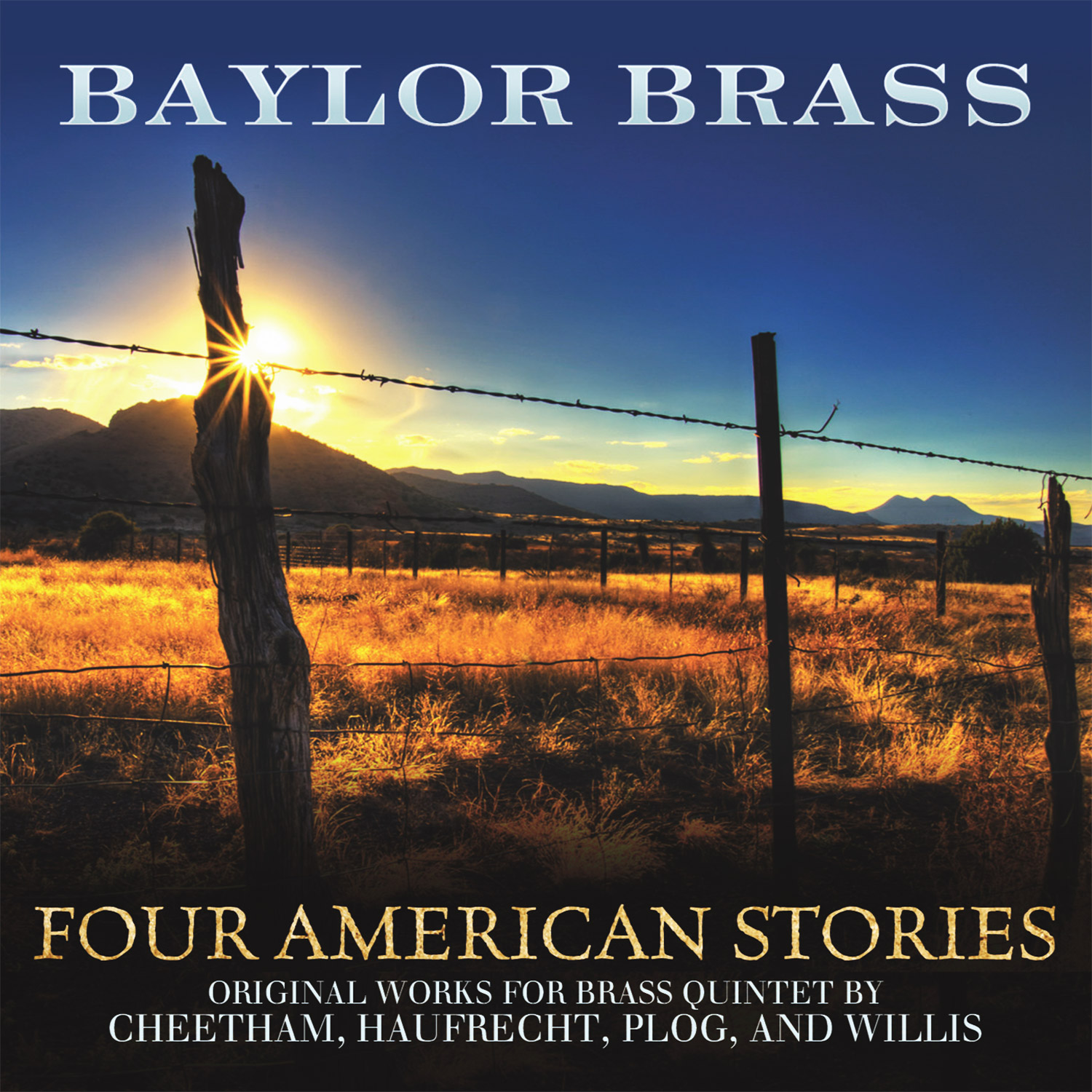
 Amazon
Amazon Follow Us on Twitter
Follow Us on Twitter Follow Us on Instagram
Follow Us on Instagram Visit Our Partner Soundset Recordings
Visit Our Partner Soundset Recordings